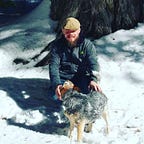There were Jellyfish in Wisconsin
Digging up beaches to accelerate the end of humanity
About six hundred million years ago, a vast shallow sea covered the land we call Wisconsin. The climate was tropical, as Wisconsin had drifted down near the Equator. If you were to drive east back then, on Interstate 94 from Minneapolis, MN to Eau Claire, WI, you would have been underwater, sometimes dune-buggying on a beach every million years or so. Jellyfish bobbed in the coral-filled waters and trilobites scuttled along the sandy seabed. Silts and clays washed down from the highlands out into the water, forming deltas into the deeps, while sands drifted to and fro on shores that shifted boundaries every millennia. The sea grew and retreated, grew and retreated for the next couple of hundred million years, until finally it decided to recede once and for all, and Wisconsin was left with strata which had lithified into sedimentary rock.
About a 150,000 years ago, glaciers from the north began to expand downward into Wisconsin. From about 100,000 to 10,000 years ago, the most recent glaciation scraped and sculpted the sedimentary layers that the seas had built, but left a portion of southwest Wisconsin untouched, which we now call the Driftless Area. Glaciers left their droppings as end moraines and on those hilly lumps plants and fungus began to grow the soil, a thin patch of skin on the rubble piles that blanketed raw stone.
Humankind began to grow crops on patches of this land, using fire, stick, stone, and bone, the most earliest of tech booms.
Now I watch the shiny green John Deere tractors traverse these hummocks as I drive this Wisconsonian roller coaster, knowing that we all live on a seabed that was once a tropical paradise, and grow corn and beans on our fragile cloaks of soil. Now, instead of dinosaurs, we have multi-conglomerate corporations roaming the hilltops, digging them up to suck out the pure quartz sand, which they call frac sand, in order to pump it into fractures in shale to prop them up so that the fossil fuels flow freely into their coffers.
